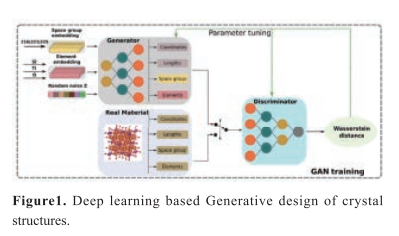Jianjun Hu *, Lai Wei1
1 University of South Carolina, Columbia, SC, 29201, United States
EXTENDED ABSTRACT: Discovery of novel materials with exceptional properties is fundamental to the technology progress to more efficient solar panels, longer-life batteries, and room-temperature superconductors. Traditionally, the discovery process is a highly ad hoc, empirical, serendipitous process based on inventors? ingenuity and knowledge. To address this issue, materials scientists mainly resort to the rational design process, in which one aims to obtain a mechanistic understanding of how materials composition and structures determine the function properties. However, the complexity of these relationships and the difficulty to enumerate all the delicate and intricate design rules makes it challenging to explore the vast chemical design space using such rational design approaches. Here we present a paradigm-shifting deep learning based generative design approach for computational discovery of novel materials including both materials composition [1] and crystal structure generative design [2]. By combining generative adversarial networks (GAN) [1], modem deep learning transformers and high-throughput first-principles calculations, we demonstrate the deep neural networks can learn the implicit chemical rules and constraints and exploit them for creative design of new materials, thus demonstrating the potential of deep generative design in new materials discovery.

Keywords: generative design; deep learning; transformers; generative adversarial networks; crystal materials.
REFERENCES
[1] Dan, Yabo, Yong Zhao, Xiang Li, Shaobo Li, Ming Hu, and Jianjun Hu, ^Generative adversarial networks (GAN) based efficient sampling of chemical composition space for inverse design of inorganic materials/' npj Computational Materials 6, no. 1 (2020): 1-7.
[2] Zhao, Yong, Mohammed Al-Fahdi, Ming Hu, Edirisuriya MD Siriwardane, Yiiqi Song, Alireza Nasiri, and Jianjun Hu. "High-throughput discovery of novel cubic crystal materials using deep generative neural networks." Advanced Science 8, no. 20(2021):2100566.

Professor Jianjun Hu has completed his PhD from Michigan State University in 2004 and Postdoctoral Studies from Purdue University and the University of Southern California in 2005 and 2007 respectively. He is the Director of the Machine Learning and Evolution Laboratory at Department of Computer Science and Engineering, University of South Carolina. His research interests include deep learning, machine learning, Al for science, materials informatics, and bioinfbrmatics. He has published more than 150 papers in reputed journals and conferences and has been serving as an editorial board member of Scientific Report, PL OS One, BMC bioinfbrmatics, and Design